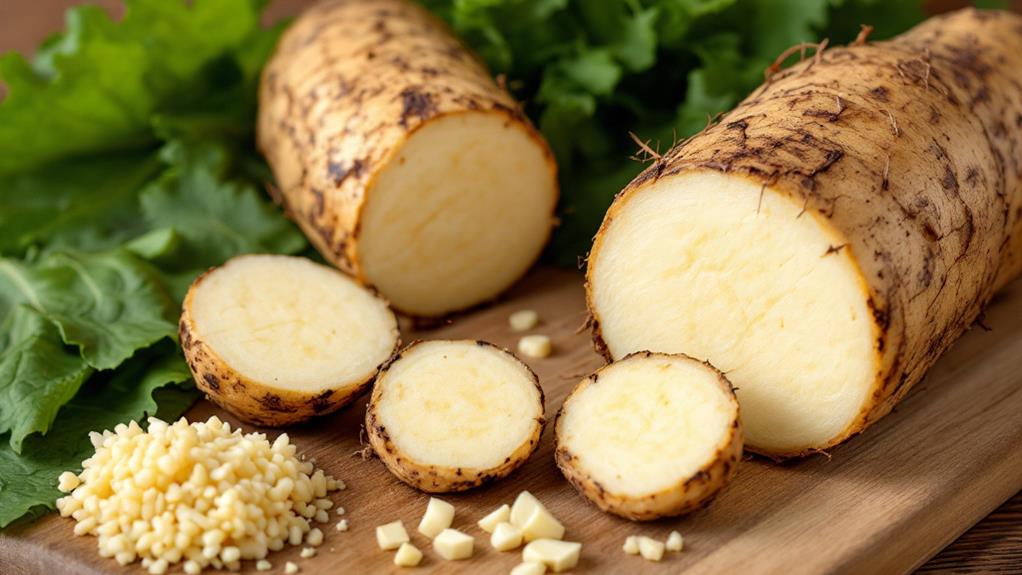Everything You Need to Know About Pomelo: A Juicy, Low-Calorie Fruit

Pomelo, native to Southeast Asia, is the largest citrus fruit you'll find, offering a sweet, juicy flavor without the tartness of grapefruit. It's low in calories, with only 231 per fruit, and provides an incredible 412% of your daily vitamin C needs. Packed with fiber, potassium, and powerful antioxidants like naringenin and lycopene, it supports digestion, immune health, and reduces inflammation. Enjoy it fresh, in salads, or as a smoothie ingredient. Pomelo also holds cultural significance during festivals and celebrations. Its benefits won't stop here, there's even more to its nutritional wonders and culinary uses.
Understanding Pomelo
In regard to understanding pomelo, you'll find it's a fascinating citrus fruit with a lot to offer. Native to Southeast Asia, pomelo, or Citrus maxima, stands out as the largest citrus fruit. Its thick rind and juicy flesh are notable features, with color ranging from light green to pale yellow. Pomelo's sweet taste sets it apart from its more tart cousin, the grapefruit, making it a favorite among citrus enthusiasts.
This low-calorie fruit is packed with health benefits, delivering a whopping 412% of your Daily Value for vitamin C in just one serving. Such a high vitamin C content means pomelo is an excellent source of antioxidants, which can help protect your body from free radical damage. This makes it not just a delicious choice, but a nutritious one as well.
Pomelo's versatility shines through its diverse culinary applications. You can enjoy it fresh, toss it into salads for a sweet and tangy twist, blend it into smoothies, or even incorporate it into desserts. Its sweet and invigorating flavor, paired with its impressive health benefits, makes pomelo a must-try for anyone seeking nutritious fruit options.
Nutritional Highlights
Although pomelo is often overshadowed by more common citrus fruits, its nutritional profile is impressive. Packed with vitamin C, a single pomelo provides a whopping 412% of your Daily Value. This makes it an excellent choice for enhancing your immune support and aiding collagen production. Despite its size, pomelo remains a low-calorie fruit, containing just 231 calories per fruit. This makes it a smart option for those watching their calorie intake.
Pomelo is rich in dietary fiber, offering 6 grams per serving, which is fantastic for promoting gut health and aiding digestion. It's an excellent source of vital minerals too, such as potassium and copper. With 28% of your Daily Value of potassium, pomelo helps maintain fluid balance and supports muscle function. The 32% Daily Value of copper in each fruit contributes to comprehensive health by supporting red blood cell production and maintaining nerve cells.
In addition to the impressive vitamin C content, pomelo is loaded with antioxidants like naringenin and lycopene. These antioxidants play a key role in combating oxidative stress, thereby supporting your complete cellular health. With these nutritional highlights, pomelo is a powerhouse of health benefits.
Antioxidant Benefits

Pomelo offers a wealth of antioxidant benefits that are hard to overlook. Packed with powerful antioxidants like naringenin, naringin, and lycopene, pomelo effectively combats oxidative stress and protects against free radicals. These free radicals can wreak havoc on your body, but the antioxidants in pomelo help keep them in check, promoting better overall well-being.
One standout feature of pomelo is its impressive vitamin C content. A single fruit provides over 400% of your Daily Value for this vital nutrient. Vitamin C is essential for enhancing immune function and improving skin health, ensuring you stay protected and radiant. The high antioxidant content in pomelo also plays a role in reducing inflammation, which can lower the risk of developing chronic diseases over time.
Regular consumption of pomelo can greatly enhance cellular health, thanks to its rich antioxidant profile. Lycopene, a well-known compound usually associated with tomatoes, adds to pomelo's anti-inflammatory properties and may even offer potential cancer-fighting benefits. By integrating pomelo into your diet, you're not just enjoying a delicious fruit; you're also investing in your long-term health by supporting your immune system and maintaining lively skin.
Health Advantages
In relation to health advantages, you can't overlook pomelo's impressive nutritional profile. This juicy fruit is a powerhouse of health benefits starting with its high vitamin C content, providing a whopping 412% of your Daily Value. This not only improves your immune system but also supports skin health. The antioxidants, including naringenin and lycopene, play a vital role in protecting your body against free radicals and inflammation, potentially reducing the risk of chronic diseases.
Pomelo is also great for your heart. Its potassium content helps regulate blood pressure and manage cholesterol levels, both important for maintaining heart health. If you're concerned about digestive issues, pomelo's fiber content can be a game-changer. With 6 grams of fiber per fruit, it aids digestion and reduces the risk of constipation and other digestive disorders.
For those focusing on weight management, pomelo is a fantastic low-calorie option. With about 231 calories per fruit, it can help you feel full without packing on extra calories. This makes it easier to maintain a balanced diet and manage weight effectively. So, adding pomelo to your diet can greatly improve your complete well-being.
Pomelo and Grapefruit Comparison

Imagine slicing into the largest citrus fruit, the pomelo, and revealing its thick rind and sweet taste, which set it apart from the more familiar grapefruit. As you investigate the pomelo, you'll notice its flesh varies from light green to pale yellow, offering a delightful contrast to the grapefruit's typical orange, pink, or reddish hues. While both fruits belong to the citrus family, their differences are striking.
Pomelo, not only larger but also sweeter, provides an impressive 412% of your daily recommended vitamin C intake per fruit, overshadowing the grapefruit's contribution. This additional enhancement of vitamin C, along with antioxidants and dietary fiber, means pomelos pack a punch regarding health benefits. Despite being low-calorie options, pomelos offer a sweeter flavor compared to the tartness of grapefruits, which are hybrids of sweet oranges and pomelos.
While grapefruits are commonly found in grocery stores, you're more likely to find fresh pomelos in Asian markets. Both citrus fruits can be valuable supplements to your diet, enriching your intake of vital nutrients. However, the pomelo's unique characteristics make it a standout choice for those seeking a sweeter, vitamin-rich option.
Culinary Applications
When you're looking to include a burst of flavor to your meals, pomelo offers a rejuvenating twist that's hard to resist. This citrus fruit isn't just delicious but also incredibly versatile in its culinary applications. Start with fresh pomelo as a revitalizing snack or dessert option. Its juicy segments make a delightful enhancement to salads, offering a zesty flavor that pairs well with a variety of fresh ingredients.
If you're a fan of beverages, freshly extracted pomelo juice is a treat. Blend it into smoothies for a stimulating twist or mix it into cocktails and mocktails to wow your taste buds with something truly unique. The juice brings a sweet yet tangy element that complements other fruits beautifully.
Pomelo also shines in desserts. Consider incorporating it into puddings or using it as a yogurt topping. The natural sweetness of the fruit improves these treats without overwhelming the palate. Don't overlook dried pomelo, either. With higher sugar content, it makes an excellent topping or ingredient in baked goods, adding both flavor and texture. No matter how you use it, pomelo is a delicious way to enhance your culinary creations.
Cultural Importance

While pomelo is a delicious fruit, its significance extends beyond the culinary domain and deeply into diverse cultures. In Chinese culture, the pomelo fruit plays a symbolic role during the Mid-Autumn Festival. It's not just a treat; it represents prosperity and good fortune, making it a common gift during this time. You can see it as a way to wish others well and bring blessings into their lives.
In traditional Indian medicine, or Ayurveda, pomelo is valued for its therapeutic properties. It's used in multiple forms to promote comprehensive wellness, highlighting its importance beyond just taste. You might find it interesting that in Southeast Asian cuisines, the pomelo fruit is celebrated for both its culinary applications and its role in rituals and festive dishes. Its presence in these cuisines is a reflection of its cultural importance.
As more people realize its health benefits, pomelo is gaining popularity in Western diets, becoming a sought-after ingredient. Regardless of being gifted during celebrations or incorporated into a healthy meal, the pomelo fruit is more than just a food item; it's a symbol of cultural richness and a bridge between traditions and modern culinary practices.
Storage and Shelf Life
To keep your pomelo fresh and flavorful, store it properly. Unpeeled pomelos thrive in a cool, dry place for up to two weeks. Their thick skin acts as a natural barrier, giving them a longer shelf life compared to other citrus fruits. If you're aiming to optimize freshness, refrigeration is your best bet. Popping your unpeeled pomelo in the fridge can extend its quality even further. Just make sure it's away from direct sunlight, as too much light can compromise its flavor.
Once you decide to peel it, the clock starts ticking. Peeled pomelo should be eaten within a few days. Its juiciness begins to fade swiftly, and you don't want to end up with a bitter-tasting fruit. So, plan your consumption accordingly to savor its full, fresh flavor.
Whole pomelos are a practical choice if you're looking for extended storage. Their intact skin keeps them fresh longer than peeled pieces. By understanding the nuances of proper storage, you can enjoy your pomelo at its peak freshness. Remember, a little attention to storage can make a big difference in maintaining the quality of this delightful fruit.
Ongoing Research

As scientists investigate deeper into pomelo's health benefits, they've uncovered several promising areas of research. Ongoing research is delving into pomelo extracts' potential to lower cancer risk, with studies showing they may suppress tumor growth in lab settings. You might find it fascinating that pomelo's antioxidant properties, particularly those of naringenin and lycopene, are being looked into for their roles in combating oxidative stress and inflammation. These compounds could play a significant role in enhancing immune function and reducing chronic disease risk.
Moreover, pomelo's impact on cholesterol levels is gaining attention. Animal studies highlight significant triglyceride reduction when pomelo is included in the diet, indicating potential heart health benefits. However, if you're on statin drugs, it's essential to exercise caution. Researchers are studying pomelo's interactions with these medications, as it may affect how they work.
The ongoing research into pomelo's health benefits is extensive and promising, aiming to reveal more about its potential role in comprehensive health improvement. Whether it's reducing cancer risk or improving heart health, pomelo's benefits might be more significant than you'd expect, making it a fruit worth watching.




